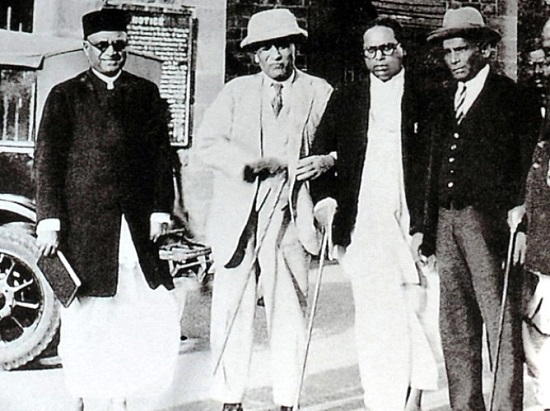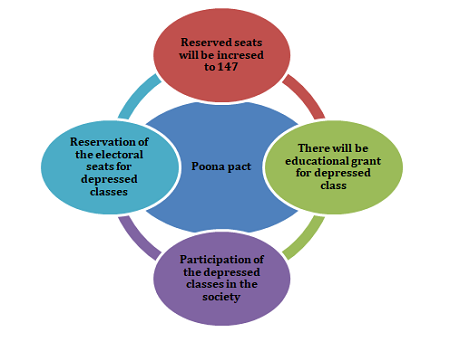

The Poona Pact had a great impact on the depressed class and the overall history of India. This pact was important for uplifting the classes that were unprivileged and their rights. The term depressed class was used to describe those people who belong to the Dalit community or scheduled caste or those, who were treated as untouchables. The communal award created the background for the pact, and the government run by the British, to provide the electorates to the depressed class, announced it.

M.R. Jayakar, Tej Bahadur Sapru and Dr. Babasaheb Ambedkar at Yerwada jail, in Poona, on 24 September 1932, the day the Poona Pact was signed
Creative Commons CC0 1.0 Universal Public Domain Dedication.
The Poona Pact was a political agreement that was between Gandhi and Ambedkar, was signed on 24 September of the year 1932, and in the jail of Poona named Yerwada Central Jail. On behalf of the depressed class, Dr Ambedkar signed the pact and on the other hand, on behalf of Hindus, it was signed by Madan Mohan Malviya and Gandhiji. As a protest against the Communal award, Gandhi undertook a fast in jail, and the pact put an end to that fasting. He believed that the award will separate the Hindus based on race. This pact was considered a solution between the different ideologies of Gandhi-Ambedkar, however, their focus was on uplifting the social condition of the unprivileged in society.
The Pact of Poona was signed on a major historical background, where many significant incidents were taking place simultaneously
Ramsey MacDonald, who was then the prime minister of Britain, announced the Communal award in the year 1932. It was about the depressed class, Muslims, Sikhs, Europeans and many more.
The award was made to implement the idea of separate electorates.
The award suggested that in legislatures each community will be allocated a certain number of seats under separated electorates. Only the members of this community will be allowed to vote to elect their representatives.
Gandhiji stands against the award because he feared that it was an effort done by the British to divide the Indians into small special groups and eventually that will affect the movement of India.
Dr. Ambedkaar was in support of the award because he thought it will help to uplift the Dalits and other depressed classes.
1932’s Poona pact was considered the solution of the negotiation between Gandhiji-Ambedkar.

Figure 1: Effects of the pact
Electoral seats will be reserved for the depressed classes
The joint electorates will do the election process for these electoral seats.
The depressed class's representation in the central legislature will be based on the joint electorate's principle.
In the provincial legislatures, the number of reserved seats for the depressed classes will be increased from 71 to 147.
People representing the depressed class will never face any obligation on any ground, such as the election of local bodies or public service.
There will be an educational grant for providing educational facilities to the representatives of the depressed classes.
The act was important in many ways, and they are
The main difference between the ideology of the Gandhi-Ambedkar were
Ambedkar’s opinion about the pact was more political whereas Gandhiji’s perspective was social.
Ambedkar wanted to remove the negative effects of the caste system while Gandhiji wanted to put an end to the whole caste system
For Dr. Ambedkar, the caste system was a problem raised by political problems and for Gandhiji, the caste system was a problem that was the result of social issues.
For Ambedkar, the depressed section of the society was the Dalits whereas for Gandhiji it was the Harijans.
The Poona Pact brought a revolution in the social-political scenario of the country ruled by the British. On one side, it saved the Hindu community from breaking into small groups and on the other hand, it played the most significant role in the betterment and uplifting of the depressed section of the country. This pact made sure the contribution of the unprivileged castes in the sector of public service.
Q1. What were the main benefits of the Poona Pact?
The Poona pact was considered the obvious result of 1932’s communal award, which was granted by the British. The pact benefited the depressed classes because it provided reserved seats to them in both provincial and central legislative councils.
Q2. Why Gandhiji founded the Harijan Sevak Sangh?
The Harijan Sevak Sangh was founded by Gandhiji and the reason behind this is to erase the concept of “untouchability” and other negative impacts of the caste system. He participated in many public meetings and addressed on behalf of uplifting the Harijan community.
Q3. Who rejected the communal award?
Mahatma Gandhi rejected the communal award because he was afraid that this would create a division on the basis of race, and as a result, it will break the Hindu community.
Q4. What was Delhi Manifesto?
The Delhi manifesto was also referred to as the Delhi statement and Gandhiji issued it in the year 1929. At that, time congress was going through a phase, where they were playing an inactive role in politics and the Simon Commission was touring this country.